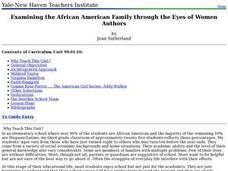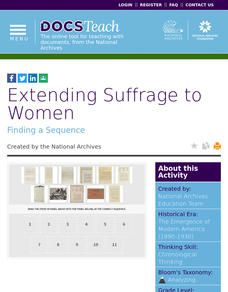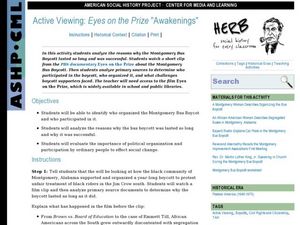Alabama Department of Archives and History
African American Life After the Civil War - Sharecropping
What is the sharecropping system? What role did it play in the post-Civil War economy of the South? Who were the sharecroppers? Who employed them? How were they paid? To answer these questions, kids examine a series of sharecropper...
Curated OER
How Has African American Culture Shaped the History of Kentucky?
Eleventh graders explore the African American culture and history of Kentucky. They observe how an author's personal bias can define the argument of his/her publication. Students analyze primary source documents.
Curated OER
Fighting for Democracy, Fighting for Me
Students consider how African American responded to social injustice. In this social injustice lesson, students compare and contrast the visions of Booker T. Washington and W.E.B. DuBois for obtaining civil rights for African Americans.
Curated OER
20th Century Civil Disobedience
Students write from varying perspectives in the American South about the civil rights movements in the 1950s. In this civics lesson, students view video clips and take notes. Students discuss the film and listen to a lecture on...
Curated OER
What is Suffrage? Understanding the Right to Vote
Students discover one of the restrictions forced on women of the early 1900s. In this civil rights lesson, students investigate suffrage and why women were not allowed to vote in the early twentieth century. Students create a mock...
Curated OER
African Americans in the Maritime Trades
Students explore Civil Rights by analyzing U.S. history. In this African American workforce lesson, students discuss the history of African Americans in Baltimore and the need for steady work that formed. Students define vocabulary terms...
Curated OER
Antisemitism in Early America
Eleventh graders explore the rise of antisemitism in the United States in the early 20th century. After reading a passage concerning one man's ordeal, 11th graders discuss how the civil rights of minority groups has been viewed in...
Facing History and Ourselves
After Charlottesville: Contested History and the Fight against Bigotry
History doesn't always reflect all sides. Academics discover how the remembered history of the Civil War differs for White and African Americans. The lesson plan explores how Civil War monuments and celebrations have racist connotations...
Teaching Tolerance
Racial Disparity in the Criminal Justice System
Explore the impact of the war on drugs in a thought-provoking lesson for high school academics. Young historians delve into the world of the criminal justice system and the racial disparity that occurs in the US. The resource provides...
DocsTeach
Analyzing a Letter from Jackie Robinson: "Fair Play and Justice"
Jackie Robinson was more than a baseball legend; he was an activist, too. An interesting resource explores Robinson's time in the military using primary sources. Scholars examine the racially inspired event that led to a court martial...
PBS
Out of the Shadows | Black America Since MLK: And Still I Rise
Two powerful video clips launch a study of race relations in the United States after the Selma, Alabama riots, the passage of the Votings Rights Act, and the riots in Watts, California.
PBS
Breaking the Code: Actions and Songs of Protest
Ezell Blair, Jr., David Richmond, Franklin McCain and Joseph McNeil changed history. Their sit-in at the lunch counter of the Woolworths in Greensboro, North Carolina on February 1, 1960 became a model for the nonviolent protests that...
Curated OER
Black Kentuckians and the Civil War
Students demonstrate how the American Civil War affected black Kentuckians socially and politically. They identify and discuss the 13th Amendment to the U.S. Constitution, which forced the end of slavery in Kentucky months after the...
Curated OER
Slavery, Manumission, and Freedom: Free Blacks in Charleston before the Civil War
Students explore the concept of slavery and manumission through a variety of activities. In this civil rights lesson, students gather information from primary sources, then analyze the politics and historical context of the time....
Curated OER
Migration and Political Power Lesson Plan: A Mapping and Graphing Activity
Students examine how the end of slavery and the diffusion of African Americans across the United States contributed to its political successes following the civil rights era. In groups, they use information from a narrative to complete...
Curated OER
Examining the African American Family through the Eyes of Women Authors
Students read stories by women authors on the characteristics of the African-American family. Using the internet, they research the history of issues that have affected African-American families from the Civil War to the Civil Rights...
Curated OER
Mississippi and Civil Rights
For this Mississippi Civil Rights worksheet, students read 9 paragraphs about the history of civil rights in Mississippi. Worksheet has no other associated activities.
Curated OER
An Experiment in Unfair Treatment/Prejudice
A rigged spelling bee gives class members a chance to experience some of the feelings associated with unfair treatment. Team one is given easy words while team two is given difficult words. As teams realize the unfairness the instructor...
K12 Reader
African American Inventors: Elijah McCoy
What do a folding iron board, lawn sprinklers, and a device for oiling engines on trains all have in common? They were all invented by Elijah McCoy, an African American inventor with 57 patents to his credit. McCoy is the subject of a...
Reading Through History
The March on Washington
How does marching get a point across to the government? Teach pupils about civics, human rights, and freedom of speech using the resource about the March on Washington. After reading, learners complete multiple-choice and short-answer...
DocsTeach
Extending Suffrage to Women
Votes for women! The activity highlights the push for the Nineteenth Amendment giving women the right to vote. High school scholars learn how the Fifteenth Amendment giving African American men the right to vote helped to spark the...
Center for Civic Education
The Power of Nonviolence: The Children's March
What was the Children's Crusade and how did it impact the civil rights movement in the United States? Your young learners will learn about this incredible event through a variety of instructional activities, from reading a poem and...
Curated OER
Voices: Voting Rights
Students examine the history of the right to vote in the United States. In this civics lesson, students research steps taken during the Civil Rights Movement to secure the rights of African Americans to vote.
Curated OER
Active Viewing: Eyes on the Prize "Awakenings"
Dive deeper into the Montgomery Bus Boycott with this multi-stage lesson, centered on the essential question: Why did the boycott last so long? Historians investigate the Jim Crow south through a video clip (not included), then analyze...

























